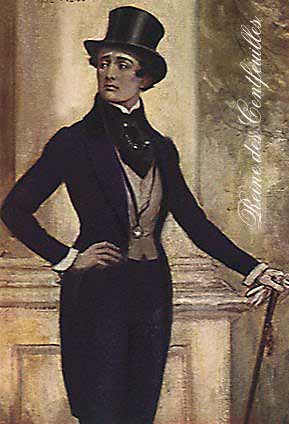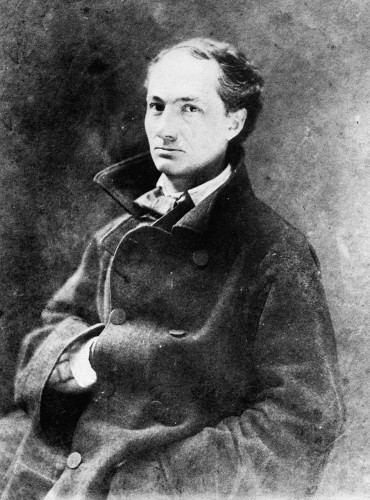jeudi, 27 novembre 2014
Le dandysme, antidote à la procrastination - Baudelaire
The following is written by Tamara Spitzer-Hobeika, who also held a discussion during the Procrastination Seminar about ‘Baudelaire’s dandy: the anti-procrastinator’ on October 29th 2014 in the Old Library, All Souls College, Oxford.
List of all speakers.
Source : "Baudelaire and procrastination : the flâneur, the dandy, and the poet", Tamara Spitzer-Hobeika, 14 octobre 2014
http://procrastinationoxford.org/2014/10/14/baudelaire/
Il n’y a de long ouvrage que celui qu’on n’ose pas commencer. Il devient cauchemar.
The only difficult work is that which we dare not begin. It becomes a nightmare.
—Charles Baudelaire
These words by the accursed poet, the writer of beautiful spleen and terrifying idéal himself, are a perfect mantra for anyone experiencing the entrancing throes of procrastination.
The sentence that follows them in his Journaux Intimes (1887)—“By putting off what one has to do, one runs the danger of never being able to do it”—confirms that Baudelaire was no stranger to procrastination. Since he speaks of it as danger, risk, or haunting nightmare, it is not surprising that he also offers thoughts on how to counter its siren call.
A few lines further, in a section titled “Hygiene. Morality. Behaviour.”, Baudelaire makes this note-to-self: “An abridgement of wisdom. Grooming, prayer, work.” As editor Claude Pichois explains, the poet viewed the ritual of prayer as a process through which to gather his spirits, focus on his work, and enhance his determination.
Indeed, although Baudelaire penned the figure of the flâneur who whiles away the hours in observant but unproductive wanderings, his journals show that he actually aspired to a work ethic that defies procrastination (“Work tirelessly six days a week”)—and that there is another key figure of his oeuvre which is closely connected to this preoccupation with time and creation: the dandy.
In his essay The Painter of Modern Life (1863), Baudelaire depicts the dandy as a man stoically devoted to “cultivat[ing] the idea of beauty” in himself, assiduously crafting his existence into a work of art. While some are quick to discard the dandy as a superficial figure, the Journaux Intimes underline that Baudelaire’s dandy has depth: he is the “superior man”, who must “be sublime without interruption” and even “like to work”, so long as it is not for the mundane purpose of making a living—since he is by definition, as is clearly stated, wealthy and powerful enough to not be concerned with such trivialities.
The dandy’s meticulous grooming and steadfast commitment to sustaining a cold, proud façade (he has an “unshakable resolve not to be moved”) are less frivolous than popular opinion would have it: as Baudelaire’s above note-to-self indicates, they are an antidote to procrastination, a morally-driven behaviour at the service of creation. By dedicating his every minute to embodying his aesthetic ideal, unperturbed by the rest of the world, the dandy’s mere being—both in appearance and thought—is art, without having to produce anything outside of himself.
The poet, however, does not necessarily have this luxury. In his poem “La Fin de la Journée” from the iconic Fleurs du Mal (1857), Baudelaire writes that a poet always welcomes nighttime with a relieved “At Last!”—not only because he revels, in romantic fashion, in its soothing shadows, but also because it “erases everything, even shame”. Tormented by the pressure of time and productivity (daytime is “pushy and shrill” in the poem), the poet feels at home in the moment at which rest and sleep (darkly likened to entombment) are expected.
As evident in the use of the words ‘erase’ and ‘shame’, artistic self-doubt looms behind the poet’s procrastinatory tendency and his desire for respite from, even destruction of, his work. In Baudelaire’s “Le Confiteor de l’Artiste” (from the prose poetry collection, Le Spleen de Paris, 1869), the speaker, in awe of the splendour and vastness of the world, confesses: “The study of beauty is a duel in which the artist screams out of fear before being vanquished.” The poet is paralysed by the beauty that he sees in the light of day, unsure he will be able to match its wonder.
The dandy, untroubled by ordinary considerations or feelings (deadlines, bills, or low self-confidence are foreign to him), is indefatigably focused on being his own masterpiece (he must even “sleep in front of a mirror”, according to the Journeaux Intimes). The poet, confronted with the realities of life and his own anxieties, instead finds solace at night, when the spectre of what has not been achieved during the day fades. He can then stop writing and revising—or on the contrary, stop putting it off and quietly start all over again—liberated by the sense that the late hours demand nothing from him, that darkness is a blank slate.
Baudelaire’s work is a Pierian spring for procrastinators. The flâneur, who merely promenades through the modern city, without aiming to create anything, may be the first of Baudelaire’s key figures to come to the procrastinator’s mind: how could the freedom of idling along the streets with no obligation not be tempting when faced with a daunting task? Moreover, as is commonly accepted, a stroll may spark renewed creativity (though that is not what the true flâneur seeks).
Yet Baudelaire’s oeuvre presents an alternate figure for procrastinators to draw inspiration from: the dandy, who pledges his life so entirely to his aesthetic principles (in a manner assimilated to ‘spiritualism’ in the author’s essay) that his every move serves to realise them. Those who have creative rituals may find a new spiritual leader in Baudelaire’s dandy and challenge themselves to emulate the constancy underpinning his sartorial and behavioural choices. As we have seen, Baudelaire apparently practiced prayer—as well as perfect dress—to concentrate his creative energy.
Nevertheless, given that neither of these “ideal” figures (who, it is important to note, are not in fact procrastinators, since they are not required to produce anything to begin with) represents a tenable way of life for the average person in our society, the procrastinator may simply find it reassuring to listen to the voice of the third figure, the poet, echoing through Baudelaire’s writing—a voice which speaks of uncertainty and fear, but still decides to ring out and not remain silent.
07:00 Publié dans Portraits de personnalités, Réflexions, philosophie | Lien permanent | Commentaires (0) | Tags : dandy, baudelaire






